
Two-Way Stretch, also known as Nothing Barred, is a 1960 British comedy film directed by Robert Day and starring Peter Sellers, Wilfrid Hyde-White, Lionel Jeffries and Bernard Cribbins. The screenplay is by Vivian Cox, John Warren and Len Heath. A group of prisoners plan to break out of jail, commit a robbery, and then break back into their jail again, thus giving them the perfect alibi – that they were behind bars when the robbery occurred. However, their plans are disrupted by the arrival of a strict new Chief Prison Officer.

Ring for Jeeves is a novel by P. G. Wodehouse, first published in the United Kingdom on 22 April 1953 by Herbert Jenkins, London and in the United States on 15 April 1954 by Simon & Schuster, New York, under the title The Return of Jeeves.

Clarissa; or, The History of a Young Lady: Comprehending the Most Important Concerns of Private Life. And Particularly Shewing, the Distresses that May Attend the Misconduct Both of Parents and Children, In Relation to Marriage is an epistolary novel by English writer Samuel Richardson, published in 1748. It tells the tragic story of a young woman, Clarissa Harlowe, whose quest for virtue is continually thwarted by her family. The Harlowes are a recently wealthy family whose preoccupation with increasing their standing in society leads to obsessive control of their daughter, Clarissa. It is considered one of the longest novels in the English language. It is generally regarded as Richardson's masterpiece.

Piccadilly Jim is a novel by P. G. Wodehouse, first published in the United States on 24 February 1917 by Dodd, Mead and Company, New York, and in the United Kingdom in May 1918 by Herbert Jenkins, London. The story had previously appeared in the US in the Saturday Evening Post between 16 September and 11 November 1916.

The Coming of Bill is a novel by P. G. Wodehouse. It was published as Their Mutual Child in the United States on 5 August 1919 by Boni & Liveright, New York, and as The Coming of Bill in the United Kingdom on 1 July 1920 by Herbert Jenkins Ltd, London. The story first appeared in Munsey's Magazine (US) in May 1914 under the title The White Hope.
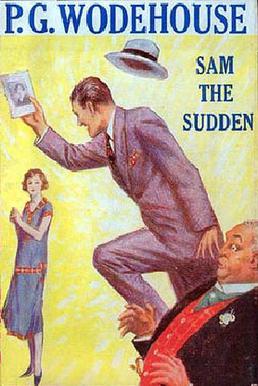
Sam the Sudden is a novel by P. G. Wodehouse, first published in the United Kingdom on 15 October 1925 by Methuen, London, and in the United States on 6 November 1925 by George H. Doran, New York, under the title Sam in the Suburbs. The story had previously been serialised under that title in the Saturday Evening Post from 13 June to 18 July 1925.

Hot Water is a novel by P. G. Wodehouse, first published on August 17, 1932, in the United Kingdom by Herbert Jenkins, London, and on the same date in the United States by Doubleday, Doran, New York.
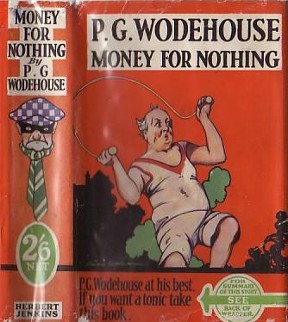
Money for Nothing is a novel by P. G. Wodehouse, first published in the United Kingdom on 27 July 1928 by Herbert Jenkins, London, and in the United States on 28 September 1928 by Doubleday, Doran, New York. Immediately prior to publication it appeared as a serial, in London Calling magazine (UK) from 3 March to 28 July 1928 and in Liberty magazine (US) between 16 June and 22 September 1928.

Jefferson Randolph "Soapy" Smith II was an American con artist and gangster in the American frontier.
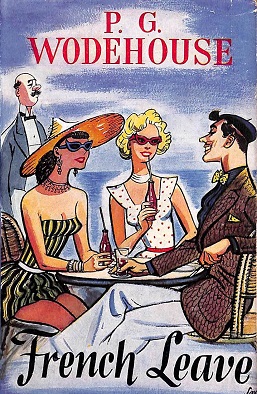
French Leave is a novel by P. G. Wodehouse, first published in the United Kingdom on 20 January 1956 by Herbert Jenkins, London and in the United States on 28 September 1959 by Simon & Schuster, Inc., New York.

Something Fishy is a novel by P. G. Wodehouse, first published in the United Kingdom on 18 January 1957 by Herbert Jenkins, London and in the United States on 28 January 1957 by Simon & Schuster, Inc., New York, under the title The Butler Did It.
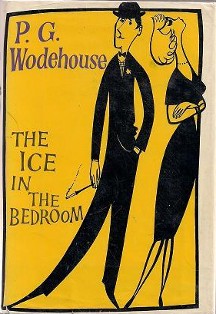
Ice in the Bedroom is a novel by P. G. Wodehouse, first published as a book in the United States on February 2, 1961 by Simon & Schuster, Inc., New York, and in the United Kingdom on October 15, 1961 by Herbert Jenkins, London.
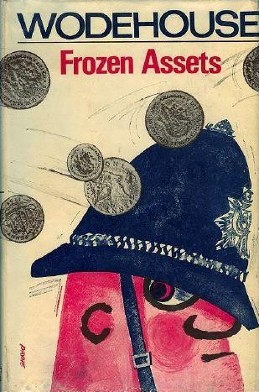
Frozen Assets is a novel by P. G. Wodehouse, first published in the United States on 14 July 1964 by Simon & Schuster, Inc., New York under the title Biffen's Millions, and in the United Kingdom on 14 August 1964 by Herbert Jenkins, London.

Company For Henry is a novel by P. G. Wodehouse, first published in the United States on 12 May 1967 by Simon & Schuster, Inc., New York, under the title The Purloined Paperweight, and in the United Kingdom on 26 October 1967 by Barrie & Jenkins, London.
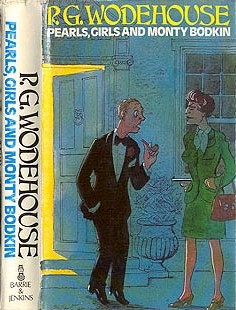
Pearls, Girls and Monty Bodkin is a comic novel by P. G. Wodehouse, first published in the United Kingdom on 12 October 1972 by Barrie & Jenkins, and in the United States on 6 August 1973 by Simon & Schuster, Inc. under the title The Plot That Thickened. Although written towards the end of the Wodehouse's life, and published 37 years after The Luck of the Bodkins (1935), the events of book follow on directly from those recounted in the earlier novel.

Bachelors Anonymous is a novel by P. G. Wodehouse, first published in the United Kingdom on 15 October 1973 by Barrie & Jenkins, London and in the United States on 28 August 1974 by Simon & Schuster, Inc., New York.

Sunset at Blandings is an unfinished novel by P. G. Wodehouse published in the United Kingdom by Chatto & Windus, London, on 17 November 1977 and in the United States by Simon & Schuster, New York, 19 September 1978. Wodehouse was working on the novel when he died in 1975. The book's first edition publisher, Chatto & Windus, gave the book its title.
The following is a list of recurring or notable fictional locations featured in the stories of P. G. Wodehouse, in alphabetical order by place name.

A rock cake, also called a rock bun, is a small cake with a rough surface resembling a rock. They were promoted by the British Ministry of Food during the Second World War since they require fewer eggs and less sugar than ordinary cakes, an important savings in a time of strict rationing. Traditional recipes bulked them with oatmeal, which was more readily available than white flour.


















